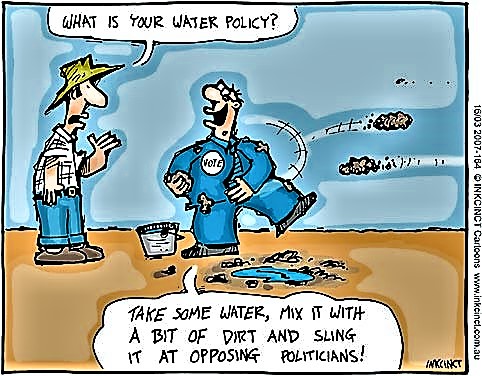Framework issues
When implementing water and sanitation measures ― including both hardware and software measures ― a framework that ensures the success of the implementation and its sustainability is needed. Without a political/legal and an institutional framework, the success any measure might be undermined by problems with legislation or missing institutions (e.g. for monitoring or enforcement) making sure the measures are implemented in a successful and sustainable way.
A proper framework ensures the rights and assets of all stakeholders (individuals as well as public and private sector organisations and companies, women as well as men (see gender issues, the poor as well as the better off), and protects public assets such as intrinsic environmental values. It is determined by national, provincial and local policies and legislation (‘legal framework’) that constitute the “rules of the game” and facilitates all stakeholders to play their respective roles bundling and unbundling of functions. The framework also includes the institutions and organisations (‘institutional framework’) created to establish these “rules of the game” and to facilitate and exercise stakeholder participation (GWP 2008).
Policies and legal framework
(adapted from GWP 2008 and 2009)
One of the core roles of any government is to formulate policies, through which it can delimit the activities of all sanitation and water management stakeholder groups, including itself. Appropriate policies can encourage participatory, demand-driven and sustainable development. Policies lead to the development of laws and rules and regulation designed to achieve policy goals. Good law for sustainable sanitation and water management recognises and acknowledges existing uses and rights, including international norms. At the same time, it is flexible enough to permit reform in response to technological change and socio-economic need.
Considering international norms and rights, local, regional or national policies are needed, which allow enforcement and enable the implementation of sanitation and water management measures. Policies delimit the activities of all sanitation and water management stakeholder groups, including the ones of the local government. They are more useful if they are designed proactively, not just as a short-term response to a crisis — although a crisis may provide an opportunity for policy change. By failing to anticipate change, and taking a narrow sectoral view, sanitation and water management policy development would frequently ignore both macroeconomics and development needs.

Sanitation and water management policy on the local level must mesh with overall national economic policy and related national sectoral policies. Sanitation and water management also means that respective issues must be taken into account within every economic and social sector. Changes in existing policies, legal frameworks and institutions — or their new development — might be required for the successful implementation of sustainable sanitation and water management measures (see also building an institutional framework or creating policies and legal frameworks).
While changing or formulating a policy for enabling sustainable sanitation and water management, it is also important for national, regional or local governments to adapt their legal framework. Without a sound legal framework, the policies will be unfeasible, and vice versa.
The role of laws for sanitation and water management is to implement and enforce policy, and provide effective administrative and regulatory mechanisms at appropriate levels. Thus, the legal framework is a powerful and crucial tool to support sanitation and water management on the local level, necessarily going hand in hand with the formulation or change of policies explained before. The creation of modern sanitation and water management-supporting legislation should follow integrated and coherent local policies.
Legislation may be reformed to include the core elements of sanitation and water management and to support the policy objectives of a national, regional or local government. The legal framework should emphasise principles in support of sustainable sanitation and water management elements.
Policies and a legal framework need to be supported by a stable institutional framework that ensures their establishment and facilitates and exercises stakeholder participation.
Find more information on how to create policies and build an institutional framework in the implementation toolbox:
GWP Toolbox. Integrated Water Resources Management
The IWRM ToolBox is a free and open database with a library of case studies and references that can be used by anyone who is interested in implementing better approaches for the management of water or learning more about improving water management on a local, national, regional or global level.
GWP (2008): GWP Toolbox. Integrated Water Resources Management. URL [Accessed: 16.05.2010]Triggering Change in Water Policies. Policy Brief 8: Technical Committee
This policy brief is a step-by-step guide on implementing new water policies. Online resource.
GWP (2009): Triggering Change in Water Policies. Policy Brief 8: Technical Committee. URL [Accessed: 06.09.2010]Manual on the Right to Water and Sanitation
The manual is a tool-written in non-legal language to assist policy makers and practitioners develop strategies for implementing the human right to water and sanitation and assist governments to operationalise their legal obligations and achieve de MDGs.
COHRE ; AAAS ; SDC ; UN-HABITAT (2007): Manual on the Right to Water and Sanitation. Geneva: Centre on Housing Rights and Evictions (COHRE) URL [Accessed: 22.04.2012]Water Supply and Sanitation Policy. White Paper
This white paper is helpful to get an idea on how policies in the sanitation and water management sector can look like.
DWAF (1994): Water Supply and Sanitation Policy. White Paper. Cape Town: Department of Water Affairs and Forestry URL [Accessed: 08.09.2010]GWP Toolbox. Integrated Water Resources Management
The IWRM ToolBox is a free and open database with a library of case studies and references that can be used by anyone who is interested in implementing better approaches for the management of water or learning more about improving water management on a local, national, regional or global level.
GWP (2008): GWP Toolbox. Integrated Water Resources Management. URL [Accessed: 16.05.2010]Triggering Change in Water Policies. Policy Brief 8: Technical Committee
This policy brief is a step-by-step guide on implementing new water policies. Online resource.
GWP (2009): Triggering Change in Water Policies. Policy Brief 8: Technical Committee. URL [Accessed: 06.09.2010]Nährstoffe und Verwendung von Düngern in der Landwirtschaft
These terms of references define the legal regulations in Switzerland concerning the water protection and air pollution control for the use of nutrients and fertilisers in agriculture.
BAFU ; BLW (2012): Nährstoffe und Verwendung von Düngern in der Landwirtschaft. Ein Modul der Vollzugshilfe Umweltschutz in der Landwirtschaft. Bern: Bundesamt für Umwelt (BAFU) / Bundesamt für Landwirtschaft (BLW) URL [Accessed: 27.05.2019]10 Keys for Local and National Action
Ten key points that are prerequisite for successful municipal wastewater management. They cover policy issues, management approaches, technology selection and financing mechanisms.
UNEP ; WHO ; UN-HABITAT ; WSSCC (2003): 10 Keys for Local and National Action . The Hague: United Nations Environment Programme Global Programme of Action (UNEP/GPA), Coordination Office URL [Accessed: 30.06.2019]http://zunia.org/
On this website, some useful documents related to water supply and sanitation policies can be found.

